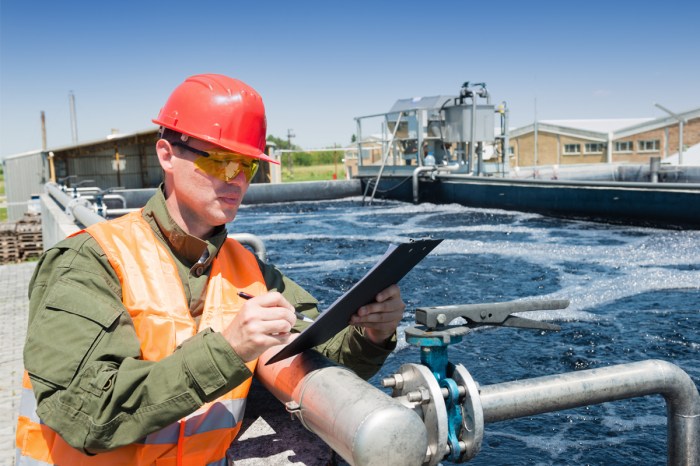How Much Does a Water Plant Operator Make?
Water Plant Operator Salaries: A Comprehensive Overview
How much does a water plant operator make – Securing clean and safe drinking water is a critical function, and water plant operators are the unsung heroes behind this essential service. Their work demands a specialized skillset and dedication, and understanding their compensation is crucial for anyone considering this career path or employing such professionals. This article delves into the various aspects influencing water plant operator salaries, providing a clear picture of the financial rewards and career prospects within this field.
Salary Ranges for Water Plant Operators
Compensation for water plant operators varies significantly based on factors such as experience, location, education, and employer type. The following table provides a general overview of salary ranges. Note that these figures are estimates and can fluctuate depending on the specific circumstances.
| Experience Level | Minimum Salary (USD) | Maximum Salary (USD) | Average Salary (USD) |
|---|---|---|---|
| Entry-Level | 35,000 | 45,000 | 40,000 |
| Mid-Level | 50,000 | 70,000 | 60,000 |
| Senior-Level | 75,000 | 100,000 | 87,500 |
Geographical location plays a substantial role in salary discrepancies. High-cost-of-living areas like major metropolitan centers on the coasts typically offer higher salaries to attract and retain qualified personnel. Conversely, smaller towns and rural areas may have lower salary ranges due to different economic conditions and lower demand.
Higher education and relevant certifications significantly boost earning potential. Operators with associate’s or bachelor’s degrees in environmental science, engineering, or related fields, coupled with certifications from organizations like the American Water Works Association (AWWA), command higher salaries and more attractive job opportunities.
Factors Affecting Water Plant Operator Compensation
Several factors beyond experience and location contribute to the overall compensation package for water plant operators. Understanding these factors provides a complete picture of earning potential.
Public sector employment, often associated with municipalities and government agencies, typically offers a more comprehensive benefits package, including robust retirement plans and health insurance, but potentially lower base salaries compared to the private sector. Private sector companies may offer higher base salaries but less generous benefits.
Union representation can significantly influence salaries and benefits. Unionized water treatment plants often have collective bargaining agreements that establish minimum wage standards, overtime pay, and other benefits, leading to more favorable compensation packages for their members.
- Overtime Pay: Water treatment plants often require around-the-clock operation, leading to frequent overtime opportunities.
- Bonuses: Performance-based bonuses can reward operators for exceeding expectations or achieving specific plant efficiency goals.
- Health Insurance: Comprehensive health insurance plans are a standard benefit in both public and private sectors.
- Retirement Plans: Public sector jobs frequently offer defined benefit pension plans, while private sector jobs may offer 401(k) plans with employer matching.
- Paid Time Off: Accrued vacation time and sick leave are common benefits.
Job Market Trends and Future Outlook

Source: govt.nz
The job market for water plant operators is projected to experience moderate growth over the next 5-10 years, driven by increasing population density, aging infrastructure, and the need for improved water quality management. Technological advancements will influence the job roles and salaries.
Automation and advanced technologies, such as remote monitoring and control systems, are expected to increase efficiency and reduce the need for manual labor in some areas. However, the demand for skilled operators to manage and maintain these advanced systems will remain high. The integration of these technologies may also lead to higher salaries for operators with expertise in these fields.
A typical career progression for a water plant operator might begin with an entry-level position, followed by advancement to a senior operator role with increased responsibilities and higher pay. Further career advancement could involve supervisory or management positions within the water treatment facility or even transitioning to related fields like water resource management or environmental consulting.
Educational Requirements and Skill Development
Essential skills and qualifications for entry-level positions typically include a high school diploma or GED, although an associate’s degree or vocational training is often preferred. A strong understanding of chemistry, biology, and mathematics is essential.
- Strong mechanical aptitude
- Proficiency in operating and maintaining water treatment equipment
- Ability to interpret data and make informed decisions
- Excellent problem-solving skills
- Ability to work independently and as part of a team
Educational programs in water treatment technology or environmental science can enhance career prospects. Certifications from the AWWA demonstrate competency and professionalism, making candidates more competitive in the job market. Ongoing professional development and training are crucial to stay updated on new technologies and regulations, improving skills and earning potential.
Illustrative Examples of Water Plant Operator Salaries, How much does a water plant operator make

Source: co.ke
The following examples illustrate how various factors influence a water plant operator’s salary. These are hypothetical examples and may not reflect actual salaries in all locations.
The salary of a water plant operator varies greatly depending on experience and location. Understanding water management is key to this role, and that involves knowing the right amount of water for different plants; this is where understanding how much do I water plants becomes relevant. Ultimately, a water plant operator’s income reflects their expertise in managing water resources efficiently, a skill directly linked to the knowledge of proper plant hydration.
- Operator A: Entry-level, high school diploma, small town in the Midwest. Annual salary: $38,000. Responsibilities include routine monitoring of equipment, basic maintenance tasks, and assisting senior operators.
- Operator B: Mid-level, associate’s degree in environmental technology, large city on the East Coast, 5 years experience. Annual salary: $65,000. Responsibilities include operating and maintaining complex water treatment equipment, performing routine testing, and troubleshooting equipment malfunctions.
- Operator C: Senior-level, bachelor’s degree in environmental engineering, AWWA certification, 15 years experience, major city in California. Annual salary: $95,000. Responsibilities include overseeing plant operations, managing staff, implementing new technologies, and ensuring compliance with regulations.
The typical work environment for a water plant operator involves both indoor and outdoor settings. Operators may work in control rooms monitoring equipment, performing maintenance in plant facilities, or conducting field tests. The work can be physically demanding, requiring lifting, bending, and working in potentially harsh weather conditions.
Question & Answer Hub: How Much Does A Water Plant Operator Make
What certifications can increase a water plant operator’s salary?
Certifications like those offered by the American Water Works Association (AWWA) or similar organizations can significantly boost earning potential.
Are there significant salary differences between urban and rural areas?
Yes, operators in larger urban areas generally command higher salaries due to higher cost of living and greater demand.
How does overtime affect a water plant operator’s annual income?
Overtime is common in this field, particularly during emergencies or peak seasons, and can substantially increase annual earnings.
What is the typical career progression for a water plant operator?
Operators can advance to senior operator roles, supervisory positions, or even management within water treatment facilities.





















